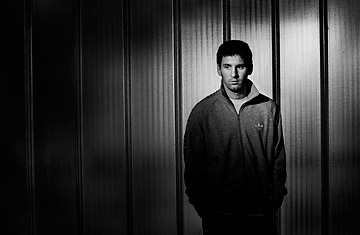
Lionel Messi of FC Barcelona, photographed Jan. 11, 2012
Yaaaaaaaargh!" The breathless magic of Lionel Messi's goal scoring often leaves Ray Hudson, the motormouth commentator for Gol TV, grasping for words. It happened again on Jan. 21 as Messi scored a brilliant hat trick in FC Barcelona's 4-1 win at Malaga in Spain's La Liga. His first, a textbook header, had Hudson declaring that "his talent would light up the national grid." After his second, Hudson described the diminutive Argentine as a "colossus bestriding the earth." But Messi's third — a slaloming run from the halfway line past three Malaga defenders, culminating in a soft, left-footed tap past the goalkeeper's outstretched hands — left the commentator with only a rasping, primal scream: "YAAAAAAAARGH!"
That must also be the sound rising inside defenders' heads when football's mesmerizing little genius bears down on them at speed. Some have found the humiliation from a player nicknamed the Flea too much to bear and have lashed out, their frustration usually, but not always, aimed at his fleet feet. During a Jan. 18 FC Barcelona match against archrival Real Madrid, a defender named Pepe, assigned the hopeless task of trying to stop the Barcelona star, contrived to stomp on his hand after Messi had been tripped yet again by another player. (The foul was as futile as it was egregious: Messi set up the decisive goal in Barcelona's win.)
It is the lot of great players to be treated shabbily on the field and royally off it. A few days before the Madrid game, football's grandees had gathered in Zurich to crown Messi, known as Leo to his subjects, as their king. The annual announcement of the FIFA Ballon d'Or is meant to anoint the best player of the previous season. This year it was practically a foregone conclusion that Messi, 24, would receive his third Golden Ball in a row.
Messi hardly looks a monarch: he possesses no hauteur, not even the I'm-the-MAN! swagger expected of a modern sporting superstar. For someone who has lived half his life in the spotlight, he is surprisingly shy, even painfully so. "Year after year, I've grown, improved," he told me after the award ceremony. "I was lucky to start very young and always have very good colleagues around me as I was coming up, and this has helped me and how I play."
Every generation produces players who change the game with their talent or approach — Puskas, Di Stefano, Pelé, Cruyff, Maradona, Zidane. Messi's third Ballon d'Or not only cemented his place in the galaxy of greats, it also made him the centerpiece of a singular argument. "Messi is amongst the best ever," quoth Manchester United's Alex Ferguson, perhaps the most successful manager of all time. Pep Guardiola, Messi's coach at Barcelona, declared that his team's superstar "could be the best player of all time." The influential British football writer Sid Lowe wrote in the Guardian: "It is no longer about whether or not Messi is currently the best player in the world; it is about whether he might even be the best there has ever been."
Messi is hailed in every football-loving country but one: his own. You would think there would be even louder hosannas in Argentina: its prodigal son, born to a steelworker and a part-time cleaner in the city of Rosario, handicapped in childhood by a growth-hormone deficiency, had gone on to foreign lands and been made sovereign of world football. But no. For all his great achievements abroad, Messi has never been fully embraced by his countrymen as one of their own, much less their king. There isn't an official Leo Messi fan club in Buenos Aires. A few days after the Ballon d'Or ceremony, Cristian Grosso, sports columnist for the Argentine daily La Nacion, noted that "while the world bows to him, he's barely starting to draw support here." Why? The headline to Grosso's column hinted at the answer: IT'S TIME TO START RESPECTING THE CATALONIAN. Catalonia is the Spanish region of which Barcelona is the capital; the headline defines Messi as one of "them," not one of "us."
Many Argentines find it hard to relate to Messi because he has played his entire professional career abroad. The traditional trajectory of a South American football star requires him to be discovered young, then play a few years for an important domestic club and develop an emotional connection with local fans before heading for greater glory in Europe. But although Messi was a child prodigy, he left Argentina at 13. At that point, his talent was already undeniable, but his size was a drawback: his height was below the third percentile for his age. When his parents and local club could no longer afford the $1,000-a-month hormone treatment to rectify this childhood deficiency, FC Barcelona agreed to recruit him and bear the expenses. (Messi is now 169 cm.) He grew up, as a man and a player, at the club's famous La Masia youth academy.
So, uniquely among his nation's top-tier football stars, he has never represented an Argentine club. He has played for the national team, but that amounts to barely 10 games a year, many of them played outside Argentina. And since debuting for the senior national team in 2005 at 18, he has won no honors of any consequence. (Messi did help Argentina take gold in Beijing in 2008, but Olympic football holds little value to fans.)
